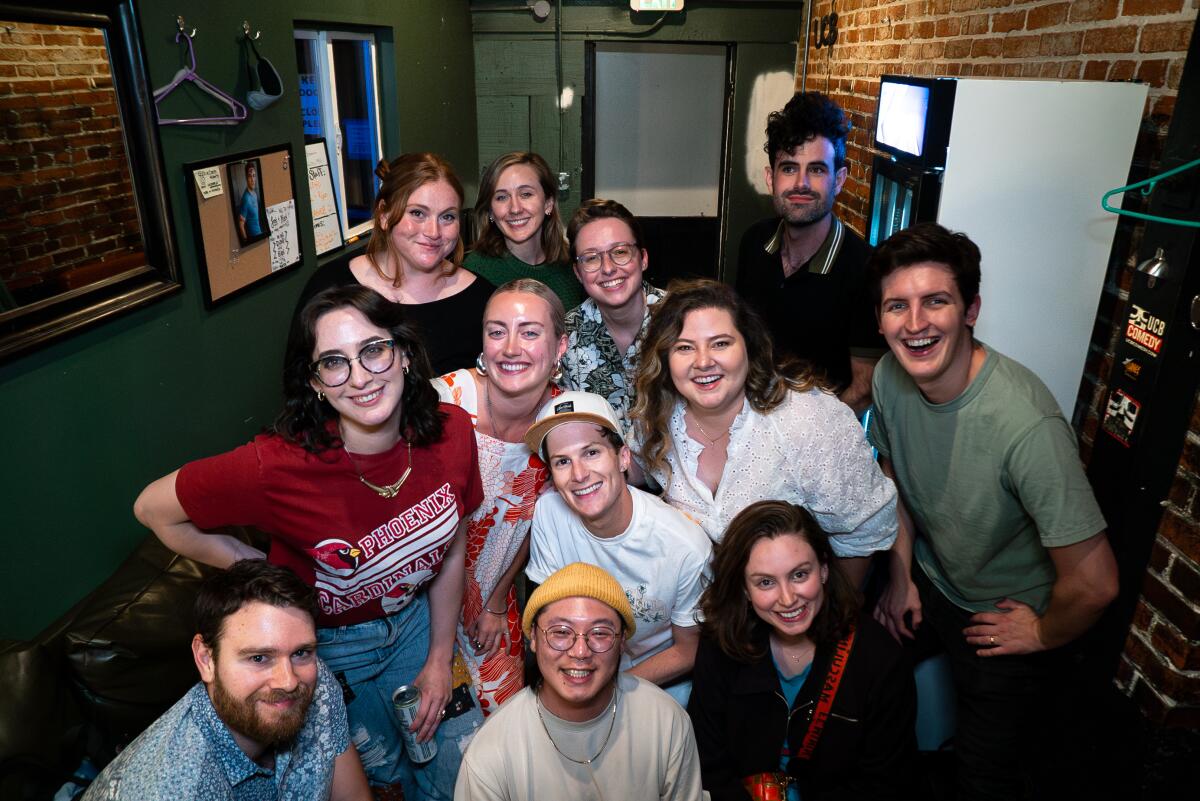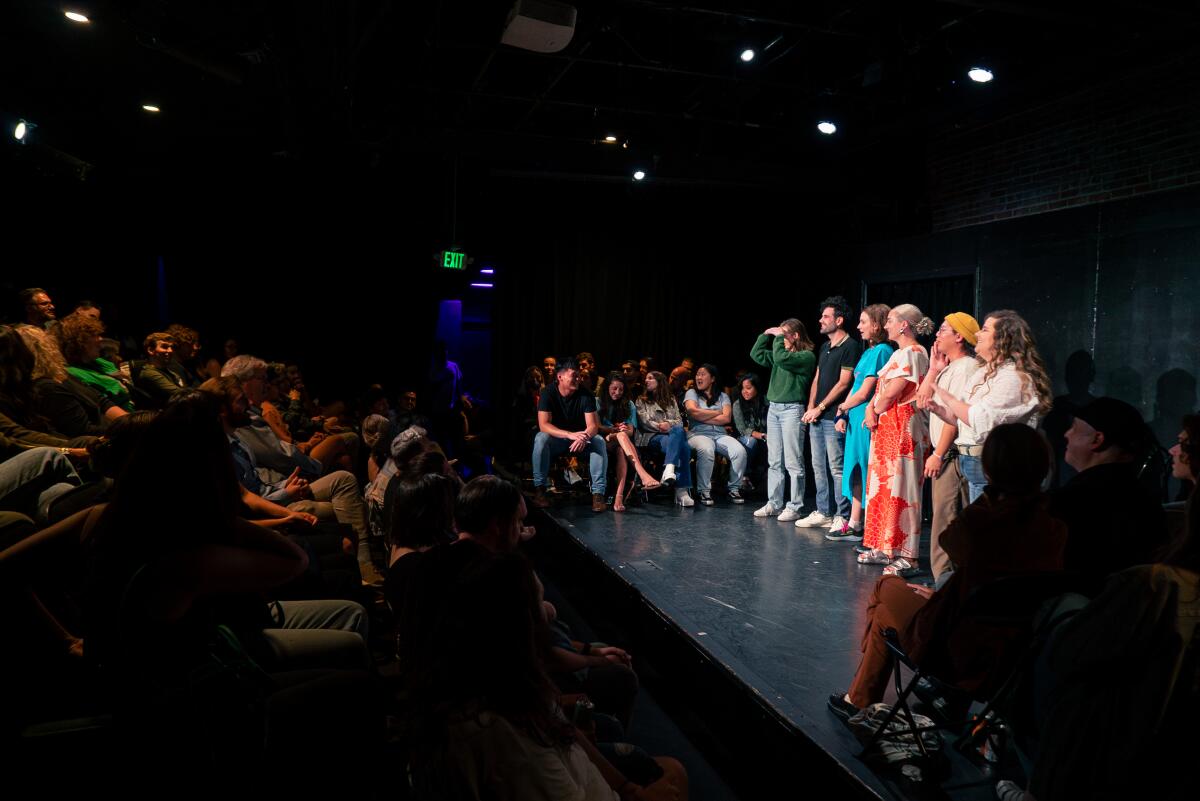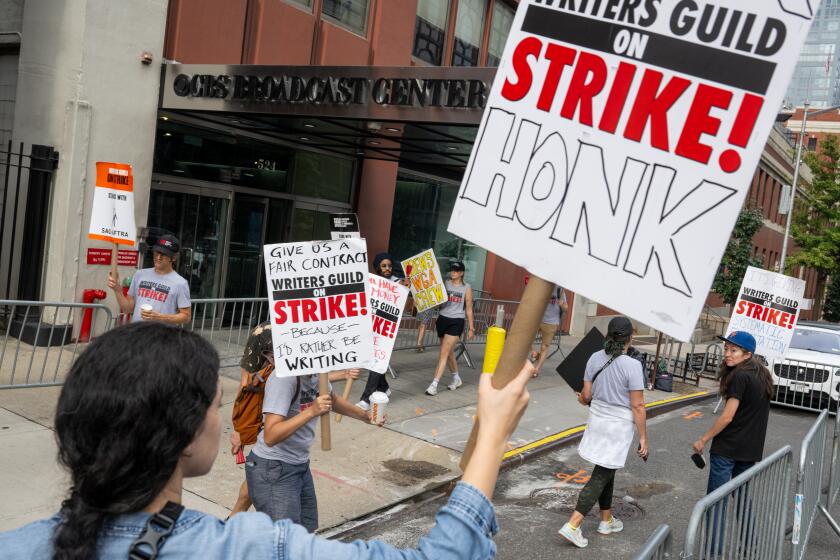Hollywood assistants arenât in the writers guild. Theyâre still hit hard by the strike

It was billed as a comedy show, but a recent night of improv at the Upright Citizens Brigade drew inspiration from Hollywood horror stories. One performer recalled interviewing for a job that required hand-delivering scripts every night to an actor in Malibu who did not use email. Another recounted having to track down golf carts that had gone missing after joy rides on the studio backlot. And more than one story involved an unfortunate encounter with fecal matter â of both animal and human origin.
Some of the performers at âLunch Is Lateâ had never met before taking the stage together during a performance in August, but they shared at least one thing in common: Theyâd all worked as assistants and coordinators â otherwise known as support staff â in television. The improv show, which raised money for Entertainment Community Fund, a nonprofit that offers emergency grants to out-of-work support staffers, was intended to shine a comedic light on some of the most grueling, poorly paid jobs in the industry. But it was also a vehicle to showcase the storytelling skills of assistants and coordinators.
âWeâre all funny and talented. But when you work these support staff jobs ⌠most of your job is not writing or performing,â says Molly Kiernan, 33, a script coordinator who co-produced âLunch Is Late.â (The title of the show is a nod to the daily task that often falls on writerâs production assistants: ordering lunch for the writersâ room.) âYou become bogged down, and especially times when youâre working a really busy job, you forget about your own talent.â
Assistant and coordinator gigs in writersâ rooms have traditionally been viewed as stepping stones: a training ground for learning the craft of being a TV writer and eventually getting staffed as one â thatâs the hope, anyway. But many in these roles have found themselves moving laterally for years, working for low wages, temporary contracts and no guarantee of ever landing a coveted TV writing job. Some of the same factors that led TV writers to go on strike in early May â smaller staff sizes, shorter and fewer seasons of television, fewer overall opportunities for employment, let alone promotion â also have made work more tenuous for support staff.
They get paid far less than TV writers and, unless theyâre given an episode to write, generally are not eligible to join the Writers Guild of America. Some roles, like writerâs assistant and script coordinator, are organized under the International Alliance of Theatrical Stage Employees; others, such as writerâs P.A. and showrunnerâs assistant, typically are not unionized, which has further contributed to inconsistencies in pay from one gig to the next. But nearly all assistants and coordinators aspire to someday become television writers and join the WGA, which means the outcome of the strike could determine their futures in the industry.

âI think a lot of us feel in limbo because for a lot of us [support staff], itâs not our union yet,â says Jorge Thomson, 30, a showrunnerâs assistant and a co-producer of âLunch Is Late.â âBut a lot of what the WGA is fighting for means more writers in the room, which will hopefully help me [and other assistants] to enter.â
Thomson got his start as a casting assistant in 2016. He worked his way up to office production assistant, then writerâs production assistant, followed by overall deals assistant and, more recently, showrunnerâs assistant. He was furloughed from his job on the Peacock show âTwisted Metalâ when the strike started. âIâve had a lot of these milestones that say youâre on the right path, like, youâre close, which Iâve really valued,â says Thomson, whoâs done scriptwriting fellowships with the National Hispanic Media Coalition and Starz. âBut I think right now itâs a harder time to break in than ever. And the ladderâs a bit broken in terms of support staff moving up.â
The way TV writer-producer Liz Hsiao Lan Alper sees it, the ladder is broken not just for support staff but for people working at all levels of the entertainment industry. âThe jobs that people are aspiring to â whether thatâs agent, whether thatâs manager, whether thatâs creative exec or producer â those jobs are seeing their pay decrease drastically because of whatâs going on with the studios,â says Alper, who got her start as a writerâs assistant on the Fox TV show âHouseâ more than a decade ago. âSo we have an entire generation of support staffers who are working toward a career that is not sustainable, full stop.â
The brokenness in the industry, which Alper attributes to its shift toward Silicon Valley- and Wall Street-driven business models, spurred her to co-found the advocacy organization Pay Up Hollywood in 2019. âWe had reached almost a tipping point in Hollywood where pay for assistants was at an all-time low,â says Alper, who has worked as a writer on âChicago Fireâ and as a writer and co-producer on âThe Rookie.â âIt hadnât been a sustainable career in a while, but because there was the uptick of mini-rooms and the first real glimpses of cost-cutting measures from the studios, the assistants were the first ones to feel that squeeze.â
Pay Up Hollywood, which began as a hashtag of the same name, conducts research and shares resources in an effort to help Hollywood assistants and shine a light on their working conditions. Its most recent survey, from 2021, found that more than 80% of support staff made $50,000 or less per year, which the federal government classifies as low-income in Los Angeles County. In the survey of more than 500 support staffers, more than 75% identified as white, and more than a quarter of survey respondents said they were between the ages of 30 and 35; nearly 13% were older than 35.
âIf you cannot survive on the absolute bare minimum, you will not be able to go after these [support staff] positions,â says Alper. âThat sort of system only benefits people who come from historically privileged backgrounds.â Alper looked to tackle this issue in 2021, when she and other writers and producers partnered with the Writers Guild Foundation to create a program aimed at training members of underrepresented groups to become support staff.

âThese are word-of-mouth jobs, so thereâs a lot of gatekeeeping,â says Thomson. âTheyâre entry-level jobs, but they also want you to have experience.â The result, he says, is a lack of diversity, particularly in rooms where many of the writers also started out as assistants and coordinators. He remembers working as a writerâs P.A. on a popular sitcom and being the only Latino in the writersâ room during its final season, despite the fact that the show featured a character from Colombia. It meant that he often felt the burden of representation, on top of his role as support staff.
Writerâs assistants are tasked with taking notes on everything discussed in a writersâ room, from pitches and jokes to story arcs and plot developments. Theyâre often the first people in the writersâ room every morning â with the exception of writerâs P.A.s, who set up the room but arenât always staffed on shows â and the last people to close their laptops at night after cleaning up and distributing their notes to the writers. Script coordinators, sometimes considered a step up from writerâs assistants, are tasked with knowing a TV showâs script from front to back, proofreading it, flagging changes and sending it out to the cast and crew. These roles can be demanding and all-consuming. But to a lot of support staff, theyâre worth it if it means getting closer to a writing career.
âI would say 99.9% of people working in that job are doing it so that they can eventually become a writer. ⌠I donât think anyone in their right mind would really do that job [otherwise],â says Kate Zasowski, 28, who has worked as a writerâs assistant since 2017 on shows including âBusy Tonight,â âAtypicalâ and âI Love That for You.â âIt is the ultimate crash course. I donât think thereâs a much better way to learn how to work in a writersâ room.â
Excelling at the job, though, can be a double-edged sword: It can mean getting recommended for future jobs, but not necessarily as a staff writer. âItâs a joke around the assisting community of like, you donât want to be too good [at being an assistant] because youâll be stuck there forever,â says Zasowski. âBecause obviously if youâre an assistant whoâs good at pitching and good at writing, then someone can save a lot of money by keeping you an assistant and also getting jokes and getting stuff written out of you.â

Zasowski found her calling in comedy at a young age. Sheâd recently switched from Catholic school to public school and she started memorizing jokes and reciting them to classmates in the hallways and on the school bus. âItâs not a recommended way to make friends, but I did develop an appreciation and a love for comedy,â she says.
She interned at Comedy Central while in college and later moved to Los Angeles and took a job as an office production assistant. Onstage at UCB, she shared a story from one of her first industry gigs, which at one point involved driving around town to find a specific kind of wrapping paper for her boss to wrap a present. It was a far cry from writing, but she figured it was a step toward becoming a writerâs assistant, which was a step toward becoming a TV writer. âI remember just being in the car and driving on that errand being like, âWow, this is really my life right now,ââ says Zasowski. âThis is the paying-my-dues part that Iâve been told about, so Iâm gonna do it.â
Itâs the same thing Kiernan told herself when she started taking comedy classes in her mid-20s and decided to pivot from working in nonprofits to working in television. Her first gig involved setting up a writerâs room for a producer, which was less glamorous than it sounded: Mostly, she sat in an apartment and waited for deliveries to arrive. Still, she says, âI busted my ass because this was my chance. And it did really propel a lot for me, because I did a good job and kept getting hired at this company.â

Kiernan eventually landed a job as a writerâs assistant, which led to multiple stints as a script coordinator, including on âBroad City,â âThe Connersâ and âLopez vs. Lopez.â Sheâd been pushing to get staffed as a writer when the strike started. Over the last few months, sheâs kept busy attending themed picket lines, including one for UCB performers and another for Taylor Swift fans. (Her beaded bracelet, which spells out âpay writers,â is a souvenir from one such event.) Sheâs also working with a writing partner on a âBroad Cityâ-style comedy about their respective struggles with epilepsy and an eating disorder.
âThe ultimate dream would be making that show, for sure,â she says. âI think what keeps me going is feeling like eventually Iâll be able to hopefully be at the helm of my own creative project.â Kiernan looks over to Thomson, who nods in agreement. Heâs hoping to someday develop his comedy pilot, âSorta Rican,â about growing up half Puerto Rican. âI think we both want to eventually be in the position where we can give other people opportunities and hire big diverse rooms and make what we want,â Kiernan says.
She and Thomson say theyâve been inspired by the WGA strike and the solidarity itâs created throughout the industry. They hope that by the time they go back to work, the studios will have agreed to staff more writers and make longer seasons of television, creating more opportunities not just for the writers but also for their assistants. Until then, their years of experience, at the very least, have provided plenty of material for improv.
More to Read
Inside the business of entertainment
The Wide Shot brings you news, analysis and insights on everything from streaming wars to production â and what it all means for the future.
You may occasionally receive promotional content from the Los Angeles Times.












